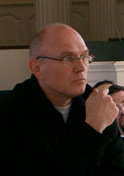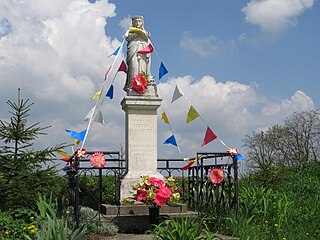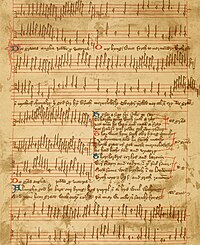In music, syncopation is a variety of rhythms played together to make a piece of music, making part or all of a tune or piece of music off-beat. More simply, syncopation is "a disturbance or interruption of the regular flow of rhythm": a "placement of rhythmic stresses or accents where they wouldn't normally occur". It is the correlation of at least two sets of time intervals.

The Life of Henry the Fifth, often shortened to Henry V, is a history play by William Shakespeare, believed to have been written near 1599. It tells the story of King Henry V of England, focusing on events immediately before and after the Battle of Agincourt (1415) during the Hundred Years' War. In the First Quarto text, it was titled The Cronicle History of Henry the fift, and The Life of Henry the Fifth in the First Folio text.

Henry V is a 1944 British Technicolor epic film adaptation of William Shakespeare's play of the same title. The on-screen title is The Chronicle History of King Henry the Fift with his battell fought at Agincourt in France. It stars Laurence Olivier, who also served as a director. The play was adapted for the screen by Olivier, Dallas Bower, and Alan Dent. The score was composed by William Walton.

Dieu et mon droit, which means 'God and my right', is the motto of the monarch of the United Kingdom. It appears on a scroll beneath the shield of the version of the coat of arms of the United Kingdom. The motto is said to have first been used by Richard I (1157–1199) as a battle cry and presumed to be a reference to his French ancestry and the concept of the divine right of the monarch to govern. It was adopted as the royal motto of England by King Henry V (1386–1422), with the phrase "and my right" referring to his claim by descent to the French crown.

Sir John Milford Rutter is an English composer, conductor, editor, arranger, and record producer, mainly of choral music.

Miroslav Volf is a Croatian Protestant theologian and public intellectual and Henry B. Wright Professor of Theology and director of the Yale Center for Faith and Culture at Yale University. He previously taught at the Evangelical Theological Seminary in his native Osijek, Croatia and Fuller Theological Seminary in Pasadena, California (1990–1998).
John Henry Maunder was an English composer and organist best known for his cantata "Olivet to Calvary".

English nationalism is a nationalism that asserts that the English are a nation and promotes the cultural unity of English people. In a general sense, it comprises political and social movements and sentiment inspired by a love for English culture, language and history, and a sense of pride in England and the English people. English nationalists often see themselves as predominantly English rather than British.

Hodie is a cantata by Ralph Vaughan Williams. Composed between 1953 and 1954, it is the composer's last major choral-orchestral composition, and was premiered under his baton at Worcester Cathedral, as part of the Three Choirs Festival, on 8 September 1954. The piece is dedicated to Herbert Howells. The cantata, in 16 movements, is scored for chorus, boys' choir, organ and orchestra, and features tenor, baritone, and soprano soloists.
Russell Schulz-Widmar is a composer, author, and conductor, and a former Professor of Liturgical Music at the Seminary of the Southwest in Austin, Texas. For much of his career he lived in Austin, Texas and upon retirement he has divided his time between Berlin, Germany and Dallas, Texas. He is married to Hubertus Schulz-Wilke.

Unser Mund sei voll Lachens, BWV 110, is a church cantata by Johann Sebastian Bach. He composed the Christmas cantata in Leipzig for Christmas Day and first performed it on 25 December 1725.

Psalm 115 is the 115th psalm of the Book of Psalms, beginning in English in the King James Version: "Not unto us, O LORD, not unto us, but unto thy name give glory". It is part of the Egyptian Hallel sequence in the fifth division of the Book of Psalms.

Johann Sebastian Bach composed the church cantata Es wartet alles auf dich, BWV 187 in Leipzig for the seventh Sunday after Trinity and first performed it on 4 August 1726.

Sie werden aus Saba alle kommen, BWV 65, is a church cantata by Johann Sebastian Bach. He composed it in 1724 in Leipzig for Epiphany and first performed it on 6 January 1724 as part of his first cantata cycle.

Christen, ätzet diesen Tag, BWV 63, is a church cantata by Johann Sebastian Bach. He composed the Christmas cantata for the First Day of Christmas, possibly in 1713 for the Liebfrauenkirche in Halle. He performed it again for his first Christmas as Thomaskantor in Leipzig, on 25 December 1723.
In allen meinen Taten, BWV 97, is a church cantata by Johann Sebastian Bach. He composed the chorale cantata in Leipzig in 1734 for an unspecified occasion. The text consists of the unchanged words of the hymn by Paul Fleming (1642).

The Mass in B minor is Johann Sebastian Bach's only setting of the complete Latin text of the Ordinarium missae. Towards the end of his life, mainly in 1748 and 1749, he finished composing new sections and compiling it into a complex, unified structure.

The Trinity Carol Roll is a 15th-century manuscript of thirteen English carols held by the Wren Library at Trinity College, Cambridge. It is the earliest surviving example of polyphonic music written in English. Compiled after 1415, it contains the earliest of two manuscript sources for the Agincourt Carol which tells of Henry V's victory at the Battle of Agincourt, as well as several early Christmas carols. The majority of texts are in Middle English with some of the carols alternating between Latin and Middle English, a common form for carols of the period known as macaronic.

The Selden Carol Book is a medieval carol manuscript held by the Bodleian Library in Oxford. Along with the Trinity Carol Roll, with which it shares five contemporaneous carols and texts, it is one of the main sources for 15th century English carols, and like the Trinity Roll contains the music as the well as the texts. The inclusion of Deo Gracias Anglia referencing Henry V's victory at Agincourt in 1415 gives an indication of the date of composition of the carols.
















